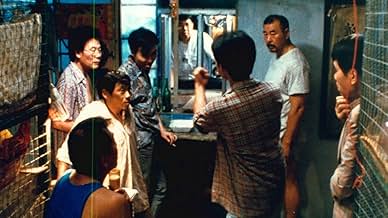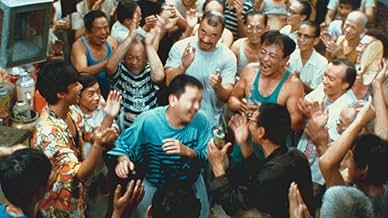The story about a young, unemployed man, who after being kicked out is desperate enough to live anywhere. He is directed to Fatso, who owns the caged establishment, and is given a living spa... Read allThe story about a young, unemployed man, who after being kicked out is desperate enough to live anywhere. He is directed to Fatso, who owns the caged establishment, and is given a living space.The story about a young, unemployed man, who after being kicked out is desperate enough to live anywhere. He is directed to Fatso, who owns the caged establishment, and is given a living space.
- Awards
- 7 wins & 5 nominations
Michael Ming-Yang Lee
- 7-11
- (as Ming-yeung Lee)
- …
Teddy Robin Kwan
- Tong Sam
- (as Tai-dik Law-ban)
Victor Wong
- Sissy
- (as Chi-keung Wong)
Tats Lau
- Man Gambling
- (as Yi-tat Lau)
Joe Junior
- Charlie
- (as Jo Juen-nei-ah, Joe Junior)
Dennis Chan
- Councillor Tsui
- (as Kwok-san Chan)
Teddy Chan
- Ho
- (as Tak-sam Chan)
- …
Wing Chu Wong
- Twin B
- (as Wing-chu Wong)
Storyline
Featured review
Winner of 4 Hong Kong Film Awards including Best Picture and Best Director, Jacob Cheung's CAGEMAN was famously toppled over heavy favorites like Tsui Hark's ONCE UPON A TIME IN CHINA II and Stanley Kwan's CENTER STAGE back then. After finally watching this movie for the first time, it's easy to see why -- CAGEMAN is one of those rare social dramas that depicts the harsh reality of poor Hong Kong residents living in caged apartment.
Set (almost) entirely at the Wah Ha Men hostel, the movie centers around a bunch of varied residents going through their mundane routines day and night. The hostel is manned by Fatso (Roy Chiao), who has a mentally-challenged son Prince Sam (Liu Kai-Chi) to look after for. Other residents are including Tong (Teddy Robin), an outspoken seller of fraudulent medicines who likes to gamble and smokes a lot; 7-11 (Michael Lee), the oldest resident who never leave his cage and he made his money by selling canned goods from his cage; Sissy (Victor Wong) is 7-11's loyal friend and worker who lives below him; Luk Tung (Ku Feng) is a handyman who often helps to fix broken things; and Taoist (Lau Shun) is a former teacher who likes to talk a lot about philosophy of life. Despite their poor lifestyle living in cramped cages, they treat each other well like a big family.
When the landlord decides to sell off the entire building, they are thrown into turmoil but they vow to fight back and refuse to leave at all cost. Soon, Fatso seeks Councillor Chow (Chow Chung) to help out their situation. Chow agrees to support them and fight for their rights at all cost. He uses his great influence to attract media attention by volunteering to stay three days at the Wah Ha Men hostel so he can understand more of these cage dwellers. At first, it looks as if there's high hope for the residents but little they do realize that Councillor Chow is actually manipulated them for his personal gain. In the meantime, there's a new resident named Mao (Wong Ka-Kui), a youngster who just released from prison and vows to stay away from triad society.
Jacob Cheung's direction is perfectly low-key while his social commentary on these cage dwellers as well as his view on hypocritical Hong Kong government are riveting to watch for. The script, written by Jacob Cheung, Ng Chong-Chow, Yank Wong and Chin Yiu-Hang, are absorbing and insightful. Not to mention, the movie is also blessed with some heartwarming moments including the one involving Fatso and Prince Sam enjoying their night together drinking a small bottle of wine and another scene involving the residents celebrating happily during the night of Mid-Autumn Festival (which is perfectly captured in a long tracking shot). Then there's the downbeat ending depicting the fate of cage dwellers, which I must say, truly heartbreaking.
All the actors here are great with some of the terrific acting ensembles ever put in a Hong Kong movie. Roy Chiao is remarkable as Fatso, while it's rare to see a popular comedian like Teddy Robin plays a different type of character that requires him to swear a lot. Liu Kai-Chi, who won Best Supporting Actor, is endearing as the mentally-challenged Prince Sam (the scene where he "scares" the wine before drinking is particularly amusing). The rest of them are just as memorable. But the most surprising of all is Wong Ka-Kui (well-known as the lead singer of a rock band, Beyond) in his tour de force performance as the young and reckless Mao. It's a great performance nonetheless but it's such a tragedy that he died in a freak accident while filming a game show for Fuji Television in Japan a year later.
While CAGEMAN may have been a great movie, it's still not without its fair share of flaws. Clocking at over two-hour long, the movie does feels a bit labored with some uneven pace. Eugene Pao and Lee Chi-Ngai's music score is sometimes distracting and awkwardly out of place (you'll know when you hear it).
Set (almost) entirely at the Wah Ha Men hostel, the movie centers around a bunch of varied residents going through their mundane routines day and night. The hostel is manned by Fatso (Roy Chiao), who has a mentally-challenged son Prince Sam (Liu Kai-Chi) to look after for. Other residents are including Tong (Teddy Robin), an outspoken seller of fraudulent medicines who likes to gamble and smokes a lot; 7-11 (Michael Lee), the oldest resident who never leave his cage and he made his money by selling canned goods from his cage; Sissy (Victor Wong) is 7-11's loyal friend and worker who lives below him; Luk Tung (Ku Feng) is a handyman who often helps to fix broken things; and Taoist (Lau Shun) is a former teacher who likes to talk a lot about philosophy of life. Despite their poor lifestyle living in cramped cages, they treat each other well like a big family.
When the landlord decides to sell off the entire building, they are thrown into turmoil but they vow to fight back and refuse to leave at all cost. Soon, Fatso seeks Councillor Chow (Chow Chung) to help out their situation. Chow agrees to support them and fight for their rights at all cost. He uses his great influence to attract media attention by volunteering to stay three days at the Wah Ha Men hostel so he can understand more of these cage dwellers. At first, it looks as if there's high hope for the residents but little they do realize that Councillor Chow is actually manipulated them for his personal gain. In the meantime, there's a new resident named Mao (Wong Ka-Kui), a youngster who just released from prison and vows to stay away from triad society.
Jacob Cheung's direction is perfectly low-key while his social commentary on these cage dwellers as well as his view on hypocritical Hong Kong government are riveting to watch for. The script, written by Jacob Cheung, Ng Chong-Chow, Yank Wong and Chin Yiu-Hang, are absorbing and insightful. Not to mention, the movie is also blessed with some heartwarming moments including the one involving Fatso and Prince Sam enjoying their night together drinking a small bottle of wine and another scene involving the residents celebrating happily during the night of Mid-Autumn Festival (which is perfectly captured in a long tracking shot). Then there's the downbeat ending depicting the fate of cage dwellers, which I must say, truly heartbreaking.
All the actors here are great with some of the terrific acting ensembles ever put in a Hong Kong movie. Roy Chiao is remarkable as Fatso, while it's rare to see a popular comedian like Teddy Robin plays a different type of character that requires him to swear a lot. Liu Kai-Chi, who won Best Supporting Actor, is endearing as the mentally-challenged Prince Sam (the scene where he "scares" the wine before drinking is particularly amusing). The rest of them are just as memorable. But the most surprising of all is Wong Ka-Kui (well-known as the lead singer of a rock band, Beyond) in his tour de force performance as the young and reckless Mao. It's a great performance nonetheless but it's such a tragedy that he died in a freak accident while filming a game show for Fuji Television in Japan a year later.
While CAGEMAN may have been a great movie, it's still not without its fair share of flaws. Clocking at over two-hour long, the movie does feels a bit labored with some uneven pace. Eugene Pao and Lee Chi-Ngai's music score is sometimes distracting and awkwardly out of place (you'll know when you hear it).
- caseymoviemania
- Feb 23, 2013
- Permalink
Details
Contribute to this page
Suggest an edit or add missing content






























